The Catalyst of the Decentralised Health Ecosystem
- Filip Milnersic
- Sep 6, 2025
- 10 min read
Updated: Sep 9, 2025
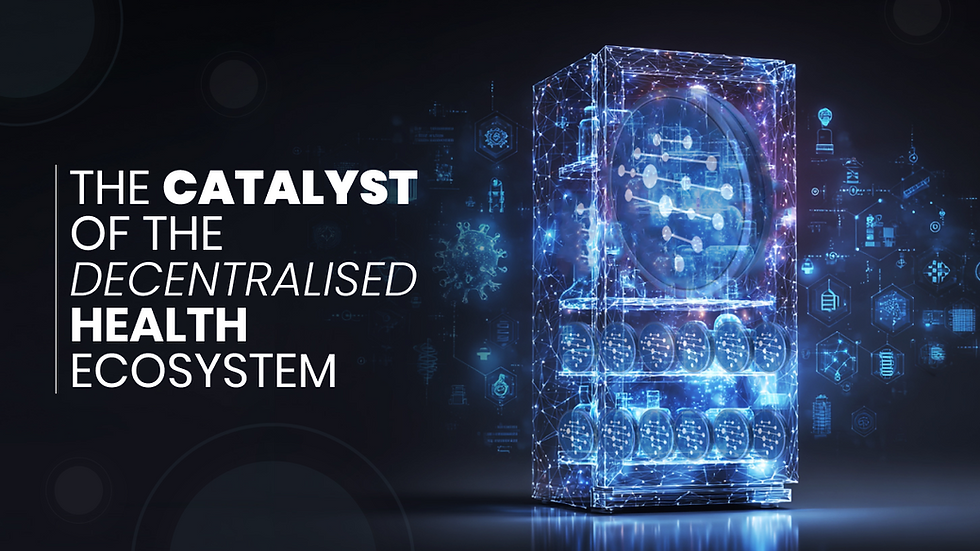
A new world is materialising before our eyes. OpenAI’s GPT technology has sparked a industry surge, and within a couple of years, daily life may resemble scenes once reserved for science fiction. Opportunities abound for all those jumping into the AI fray, aiming to give the GPT technology a specific use case.
The aforementioned is best described by a paraphrased story from Warren Buffett, combined with Chamath Palihapitiya’s perspective on the quote.
The people who invented refrigeration made some money, but most of the money was made by Coca-Cola, which used refrigeration to build an empire.
Chamath Palihapitiya’s perspective on Warren Buffett’s refrigeration insight:
“I look at today’s large‑language models the same way - they’re the refrigeration. Will the model‑makers make some money? Sure. But the Coca‑Cola of AI hasn’t been built yet, and that’s where the real monetization will happen.”
In other words, products with a unique “extra ingredient”—proprietary data, distribution, brand, regulatory lock‑in—will capture outsized value once LLMs are ubiquitous.
That is precisely what the dHealth AI Agent will do. And more than that, it is set to become the Catalyst of the Decentralised Health Ecosystem. An unstoppable solution for the legacy healthcare systems that have long resisted decentralisation and technological improvement in general.
The dHealth AI Agent provides a zero-friction onboarding process with the benefit of full privacy and data ownership. It’s a solution that decodes health data, safeguards user privacy, and seamlessly connects individuals with their healthcare ecosystem—on their terms.
Entirely hands-free.
The Decentralised Health Ecosystem facilitated by the agent is further enriched through utilisation of fully homomorphic encryption and blockchain technology—delivering a holistic solution for the needs of a modern healthcare user. A Needed Change in the Legacy Healthcare System

Blockchain alone promises sweeping cost efficiencies and incredible value propositions for patients and providers alike. These potential benefits are clearly manifest across every imaginable use case: donor cards, vaccine tracking, viral-outbreak symptom tracking, treatment & live trial tracking, and more. All these use cases benefit immensely from the concept of a highly accessible, trustless environment.
The dHealth agent targets three major friction points that have insofar prevented massive adoption of blockchain-based healthcare data-acquisition & management systems:
• Reliance on legacy systems and the pervasive red tape in the healthcare industry
• Creation of a wallet and the required basic blockchain understanding—to operate securely
• Complexity of manual input of user data into appropriate format for automatic processing
Digging deeper, that dependence on legacy systems and the red tape issue stems from two realities:
• Seriousness of the environment where small changes without heavy due diligence can cause life loss or significant injury—sew a button slightly off—nobody bats an eye; measure the dosage incorrectly—the patient dies
• Lobbying and preservation of self-interest of large healthcare stakeholders
It’s worth noting that what looks like preservation of self-interest isn’t always short-sightedness of executives. Corporate law obliges pharma executives to maximise short-term profits—so they act accordingly.
While both factors hinder adoption of every new technology or methodology in healthcare, blockchain hits the hardest wall at the second: entrenched self‑interest.
This self-interest pertains to data ownership. In a decentralised environment, it is clear to whom the data should belong, while on the other hand—pharmaceutical companies want to preserve their ownership over highly valuable data. The end result is known. All major healthcare stakeholders have for this reason in particular—shied away from truly decentralised solutions.
Consequently, digital‑health innovations limp toward adoption at a discouraging pace. Now that the hurdles of technological adoption in the healthcare industry are understood, we can dive deep into how dHealth’s AI Agent will soar above all the issues.
The dHealth AI Agent

The modern patient’s medical story is scattered across after‑visit summaries, fitness trackers, late‑night symptom notes, and hazy recollections of old prescriptions. In this cacophony, the dHealth AI agent emerges as a seasoned conductor, coaxing every stray note into a single, coherent symphony. At first launch, it creates a self‑custodied wallet, generates cryptographic keys, and seals them in a vault no outsider can touch. The user feels none of the underlying mechanics—there is only the calm prompt: “How can I help with your health today?”
Users speak a concern, snap an X‑ray, or forward a wearable export: the agent recognises each input, reshapes it into FHIR-compliant format and seals it with encryption. During this journey every byte is cloaked—not even the servers that route the packets glimpse what they carry. When a cardiologist, an insurer, or a research DAO requests access, the agent checks the ledger, presents the user with a clear‑language consent card, and immutably records the decision. Mathematics and transparent audit trails enforce trust, not promises.
Identity, the weak seam of most digital health ventures, is sewn tight with decentralised biometric verification. A brief scan—depth‑mapped face geometry, micro‑pulse analysis, heart‑rate variability—anchors one living human to one decentralised identity, banishing duplicate accounts and scripted bots without corralling people behind passwords that can be misplaced. For geriatric users, whose eyesight or dexterity may falter, voice navigation and large‑type prompts transform the technical marvel into an accommodating companion.
The broader health economy stands to gain just as much. Pharmaceutical sponsors see cleaner longitudinal data flowing in real time, trial nurses spend fewer hours deciphering handwritten logs, and supply‑chain auditors replace barcode drudgery with camera sweeps that the agent interprets on the fly. In every corner case—from rare‑disease advocacy groups to corporate wellness dashboards—the same engine orchestrates beneath the surface, translating lived experience into provable, shareable, and ultimately actionable insight.
Such overwhelming value shifts the adoption decision away from pharma boardrooms—toward everyday users. As end‑users flock to the agent, pharmaceutical giants will have no choice but to follow.
To crystallise its advantages, the agent’s headline benefits are as follows:
• Consolidate a rich personal health data trove effortlessly—simply by using the tool
• Optionally license your data for research—with automatic, hassle-free compensation
• Access a holistic AI ‘doctor’ that taps this trove to deliver guidance once unattainable—at a fraction of traditional cost
• Pay for digital health services automatically through the AI Agent
• Carry out blockchain tasks—buying DHP or AIDH included—safely and seamlessly, no crypto know-how required
• Stake DHP or lock AIDH on command while the agent handles every technical detail under the hood • All of the above, acting on written or verbal commands—in any language
The biggest advantage, alongside the privacy guarantee—is the fact that dHealth AI agent users are always using the best AI model & tech stack for the job.
This is a result of dHealth's consistent testing, experimentation and fine-tuning of available AI models & related technology that work best for the use cases above—removing that heavy burden from end-users.
In short, when you use the dHealth AI agent—you’re using top-of-the-line, medical-grade AI. Always.
Now, let’s learn how to gain access to this incredible technology!
Getting Started with dHealth’s AI agent
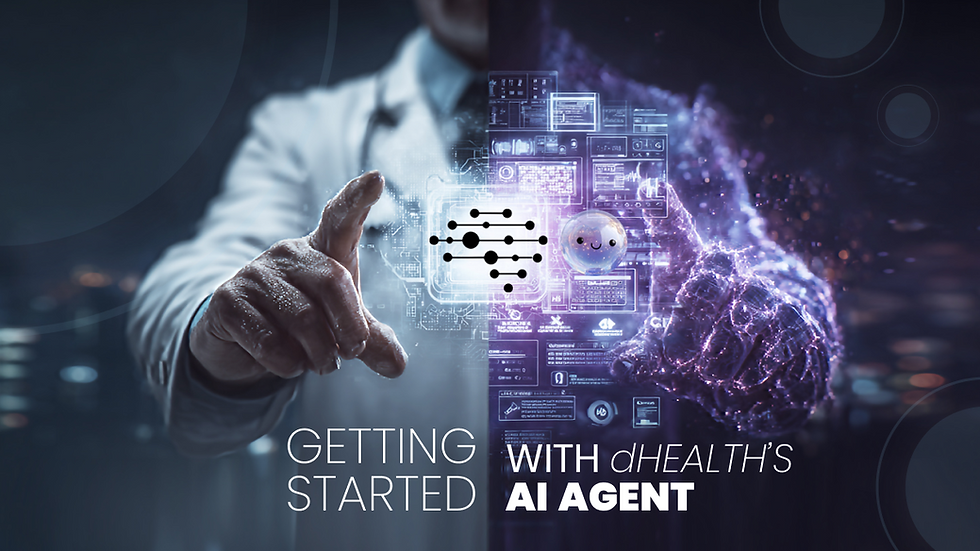
Outside of minor on‑chain fees pertaining to specific use cases like encrypted data sharing—the agent itself costs nothing to use.
Users will be able to download the agent via the Google Play Store or Apple’s App Store, with free usage limited to 1MB data limit, and no memory or history. To utilise the full power of the AI Agent, the subscription cost is $50 a year, further reduced to $25 should a user take advantage of the 50% discount by locking $25 worth of AIDH tokens.
The agent allows sponsored use for communities and organisations where said groups pay for the use of the agent, costing $25 per person—offering further discounts if the groups lock AIDH tokens. Patient organisations and community partners receive guidance on onboarding members, and managing access—directly from the dHealth team.
Every onboarding flow—solo or group—includes biometric KYC to confirm that each participant is a real, unique human.
The KYC process is performed by capturing three unique biometric parameters:
• smartphone-based face scan utilising depth mapping • heart‑rate variability scan
• photoplethysmography
The system’s real-time detection of blood flow verifies that the person is physically present and actively engaged, offering unmatched security and authenticity.
After the automatic KYC is completed, it’s time to begin the dialogue. “Archive today’s dermatology report,” “Map my weekly glucose trend,” “Share rehab metrics with Dr. Kim.”
Each request is parsed, encrypted, and executed via dHealth’s privacy-ensuring servers running the privacy-focused AI Agent.
Switch doctors, move countries, add a new wearable—the agent adapts instantly, no reinstall needed. Behind every addition remains the same guarantee: the keys stay with the user, the ledger shows every access, and consent is a reversible switch, not a one‑way plunge.
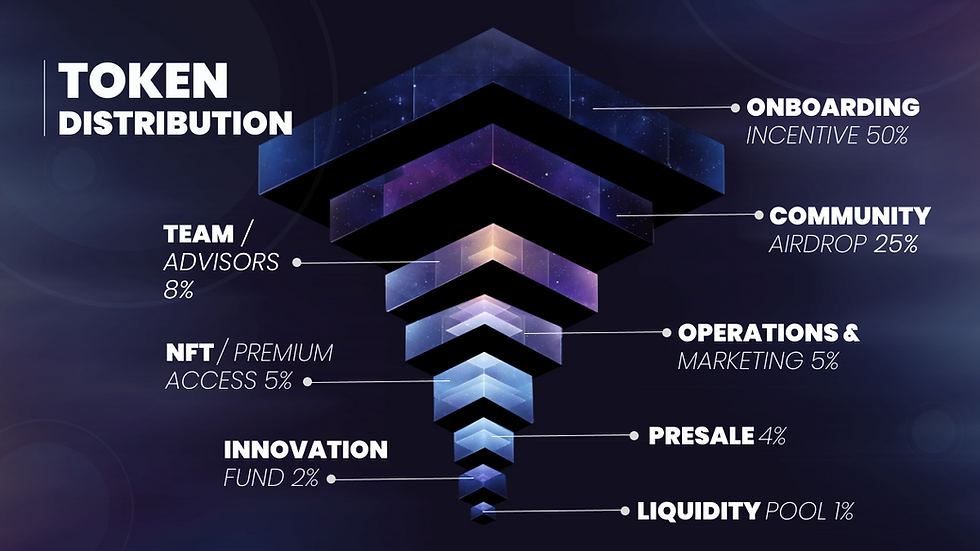
To be early on the AIDH token, it is possible to acquire an NFT that not only provides free agent access with premium features for up to 10 people, 20 GB decentralised storage, human support and personalised strategy for longevity and cognitive performance, but also—a very generous allocation of AIDH tokens. The token powering the AI Agent.
The dHealth community is well aware of all the work done prior to the introduction of the dHealth AI Agent, but for those less acquainted—let's dive into it shortly.
dHealth Network
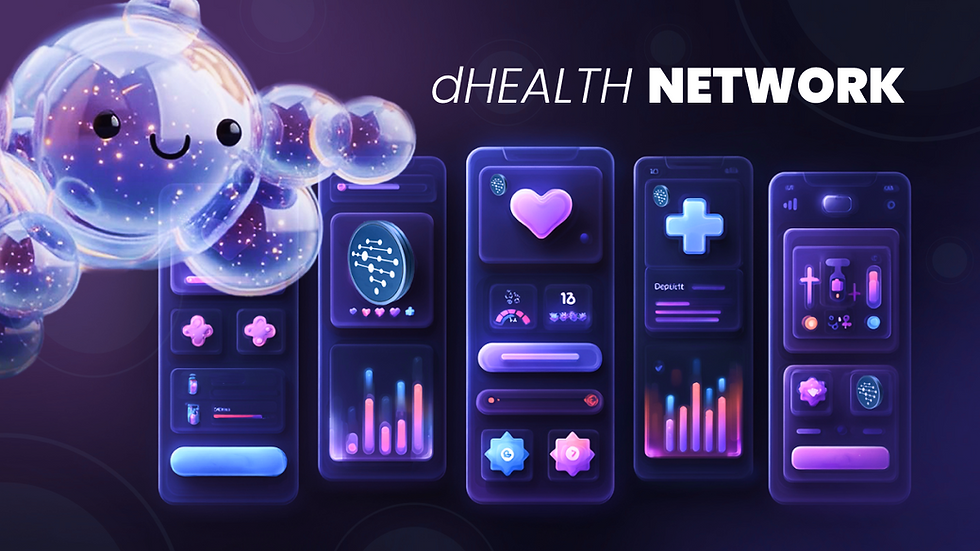
The AI Agent leverages technology developed in the past—namely the dHealth network, and its adjacent technology—Fully Homomorphic Encryption (FHE).
Fully Homomorphic Encryption allows dHealth network users to store encrypted data and provide access to it via a zero-knowledge process, to perform analysis—without revealing the data itself. A truly groundbreaking technology, first introduced conceptually by IBM in 2009.
There are dozens of use cases the dHealth team developed on its own or via partnerships that have not yet yielded adoption. However, some of these use cases now have an opportunity to be revived by leveraging AI.
Prior realized use cases and partnerships Novartis & University of Basel
Early Detection of Covid Cases in Subsaharan Africa. Fully developed but never implemented because Novartis could not find a country that wanted to use it.
Bowhead Health Exploratory partnerships focused on developing dApps on the dHealth Network.
MIT ADT Student courses and support of students building dApps on dHealth Network.
The Swiss Tropical and Public Health Institute replaced a paper-based system for the supply-chain routes of rabies post-exposure prophylaxis in West Africa. The project was funded by EDCTP. Using the dHealth Network as a secure, transparent, and easily accessible data repository empowers all project stakeholders to monitor real-time transport, administration, and health status developments—potentially averting rabies-related tragedies.
Treatment compliance support in Tuberculosis Patients—a Health2Earn concept, earn DHP for filling out surveys related to your tuberculosis treatment. Crucial assistance in tuberculosis treatment as the treatment lasts on average 6 months, and discontinuing treatment can have a severe impact on the patient.
dHealth developed the concept of a blockchain-based organ donor certificate (ODC) in conjunction with OrganX and Paris Transplant Group—to ensure secure and tamper-proof donor records, protecting donor wishes without storing personal information in a database. It allows individuals to control access to their ODC, ensuring their donation preferences are respected, and provides transparency for transplant sites and authorities. The system aims to reduce deaths on transplant waiting lists. Read more.
With the CENTIVA LIFE DeSci dApp, researchers can collect data. At the same time, blockchain protects the users’ privacy. It can also be used to incentivise users to make their data available. Co-created with Roche to monitor treatment progress in rare disease patients.
Not quite a use case, or a partnership—but a worthwhile mention—dHealth joined the RedCap Consortium in 2019 and still is part of the consortium. REDCap is a secure web application for building and managing online surveys and databases. While REDCap can be used to collect virtually any type of data in any environment (including compliance with 21 CFR Part 11, FISMA, HIPAA, and GDPR), it is specifically geared to support online and offline data capture for research studies and operations.
Furthermore, dHealth partnered with Gifu University to explore cell sample tracking using blockchain, University of Zurich Blockchain Center, Nodestake as an RPC Provider and Node Operator, Eli Lilly as a Node Operator and Green Consensus which utilised dHealth technology to Incentivize research participants to share their experience taking Cannabitriol(CBT).
Recent partnerships and grants
Fast forward to the present—just a week ago dHealth secured a new valuable partnership with Spitex Biel, one of Switzerland’s largest home care organisations. Spitex Biel-Bienne and dHealth are exploring how AI can streamline nursing documentation and enhance home visit planning.
The dHealth team was also very recently granted an infrastructure grant to run the agent by Amazon Web Services(AWS) and a crucial partnership was forged with Load Network for confidential & decentralised storage of individual’s health data.
It is also worthwhile to mention that the dHealth team created UPD8—a fitness app powered by DHP. Supporters of dHealth can expect this project to be revived in light of dHealth’s explosive success.
To conclude—it is no small feat for a blockchain startup to land partnerships with commercial giants the likes of Roche, Eli Lilly and Novartis—top 2nd, 6th and 7th pharmaceutical companies in terms of revenue, academic giants the likes of University of Basel and Gifu University, and institutions such as Swiss TPH and National Lung Hospital Vietnam, which employs more than 1000 healthcare workers.
The recent grant award from Amazon Web Services, and partnership with one of Switzerland’s largest home care organisations proves dHealth's string of strong partnerships is a pattern—an unstoppable trend that will result in a paradigm shift in the broader healthcare ecosystem.
Paradigm Shift

With the advent of AI technology utilisation across all industries, dHealth will be a pioneer, relying heavily on both prior technology developed, and further agentic AI development. New features are already being developed such as the Healthcare Outcome Markets, a novel platform where users trade tokens representing verified health outcomes. The primary target users of this innovation are pharmaceutical companies that are seeking to hedge their risks related to expensive pharmaceutical research. However, anyone will be able to participate in this decentralised market. Think Polymarket—but for pharmaceutical research.
To become a part of this paradigm shift the first step is to join the dHealth community, and in preparation for the token launch—acquire the dHealth NFTs. The NFTs provide a generous allocation of dHealth’s AI agent token alongside other key benefits.
The agent demo release is set for next week!
To ensure rapid adoption, a considerable amount of AIDH tokens is dedicated to onboarding incentives, which can be understood as part of a carefully designed MLM strategy.
The desktop AI agent is set to be the first version of the agent made publicly available. Mobile version will follow, tentatively planned release set for Q1 2026. The token will initially be deployed on Solana and dHealth chain. With the exciting cross-chain Cosmos update planned for Q4 2025—the AIDH token will be able to move to any chain, at any time, via a fully decentralised protocol. Become a pioneer today and be among the first to join the AI revolution in healthcare!


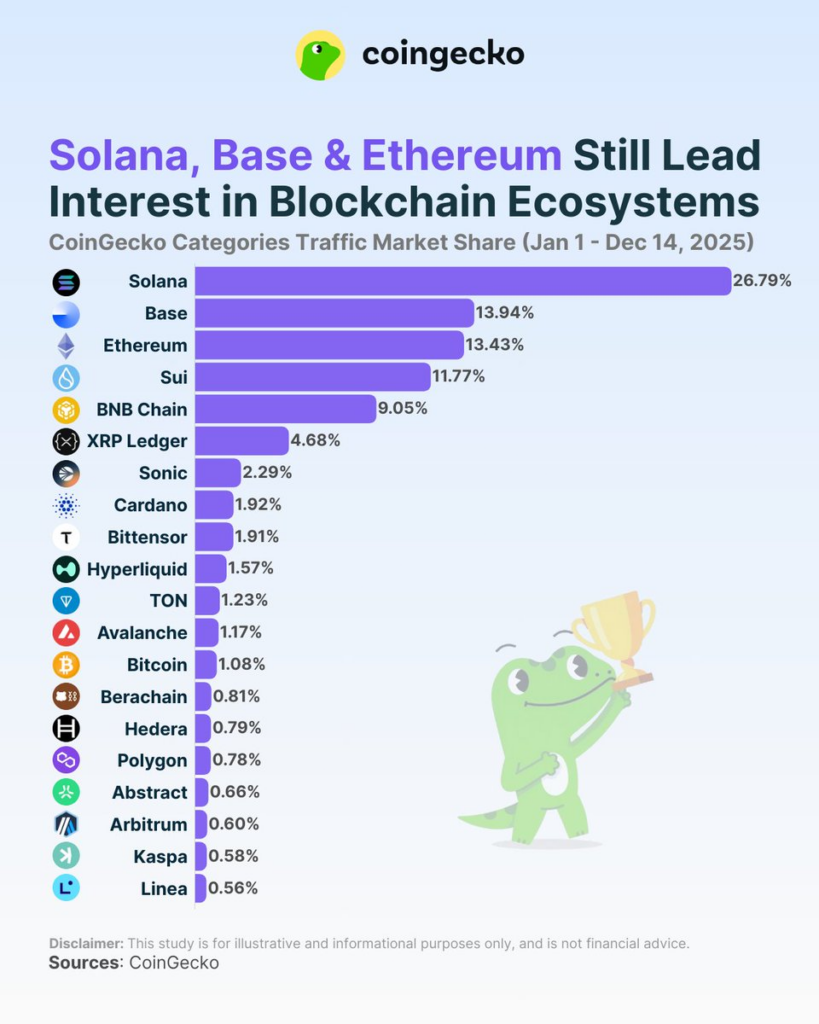

Comments